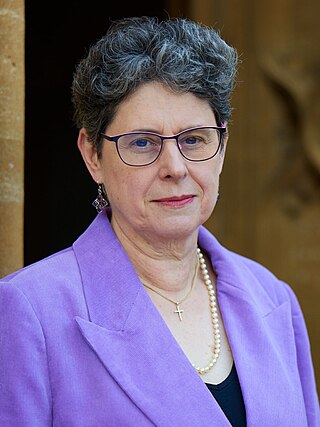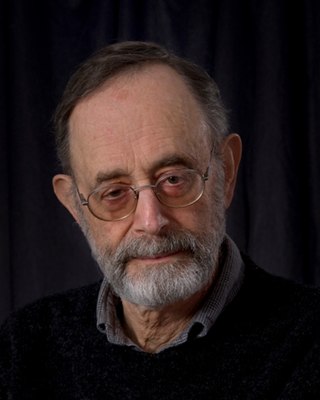
Zygmunt Bauman was a Polish-born sociologist and philosopher. He was driven out of the Polish People's Republic during the 1968 Polish political crisis and forced to give up his Polish citizenship. He emigrated to Israel; three years later he moved to the United Kingdom. He resided in England from 1971, where he studied at the London School of Economics and became Professor of Sociology at the University of Leeds, later emeritus. Bauman was a social theorist, writing on issues as diverse as modernity and the Holocaust, postmodern consumerism and liquid modernity.
Bariolage is a musical technique used with bowed string instruments that involves rapidly playing alternated notes on adjacent strings, one of which is generally left open, thereby exploiting the different timbres of each string. Bariolage may involve quick alternation between a static note and changing notes that form a melody either above or below the static note. The static note is usually an open string note, which creates a highly resonant sound. In bluegrass fiddling the technique is known as "cross-fingering".
Robin Hood's Chase is Child ballad 146 and a sequel to Child ballad 145, "Robin Hood and Queen Katherine". This song has survived as, among other forms, a late seventeenth-century English broadside ballad. It is one of several ballads about the medieval folk hero that form part of the Child Ballads, a comprehensive collection of traditional English and Scottish ballads.
Robin Hood's Golden Prize is Child ballad 147. It is a story in the Robin Hood canon which has survived as, among other forms, a late seventeenth-century English broadside ballad, and is one of several ballads about the medieval folk hero that form part of the Child ballad collection, which is one of the most comprehensive collections of traditional English ballads.
Hugh Wood was a British composer.
David Victor Canter is a psychologist. He began his career as an architectural psychologist studying the interactions between people and buildings, publishing and providing consultancy on the designs of offices, schools, prisons, housing and other building forms as well as exploring how people made sense of the large scale environment, notably cities. He set up the Journal of Environmental Psychology in 1980. His work in architecture led to studies of human reactions in fires and other emergencies. He wrote about investigative psychology in Britain. He helped police in 1985 on the Railway Rapist case. He was the professor of psychology at the University of Surrey for ten years, where he developed investigative psychology described in detail in Investigative Psychology: Offender Profiling and the Analysis of Criminal Action and a course curriculum. He set up and was director of the Centre For Investigative Psychology, which is based at the University of Liverpool. From 2009 he was at the University of Huddersfield, where he directed the International Research Centre in Investigative Psychology. He retired from there in 2018. He is emeritus professor at the University of Liverpool and continues to publish in environmental and crime/forensic psychology.
David S. Wall FRSA FAcSS is Professor of Criminology at the Centre for Criminal Justice Studies, School of Law, University of Leeds, England, where he researches and teaches cybercrime, policing, organised and transnational crime and intellectual property crime. He rejoined the University of Leeds in August 2015 from Durham University, where he was Professor of Criminology. Between 2011 and 2014 he was Head of the School of Applied Social Sciences (SASS). Before moving to Durham in 2010 he was Professor of Criminal Justice and Information Society at the University of Leeds, where he also held the position of Head of the School of Law (2005–2007) and Director of the Centre for Criminal Justice Studies (2000–2005). He is a Fellow of the Alan Turing Institute.
The Battle of Nish was fought between the Crusaders led by John Hunyadi and Đurađ Branković and the Ottoman Empire led by Kasim Pasha. It saw the Crusaders capture the Ottoman stronghold of Nish (Niš) in Serbia, and defeat two armies of the Ottoman Empire. The Battle of Nish was part of Hunyadi's expedition known as the long campaign. Hunyadi, at the head of the vanguard, crossed the Balkans through the Gate of Trajan, captured Nish, defeated three Ottoman pashas, and after taking Sofia from the Ottomans, united with the royal army and defeated Sultan Murad II at Snaim (Kustinitza). The impatience of the king and the severity of the winter then compelled him to return home.
Alan Brian Carter is Emeritus Professor of Moral Philosophy at the University of Glasgow.

Sarah Rosamund Irvine Foot, is an English Anglican priest and early medieval historian. She has been Regius Professor of Ecclesiastical History at the University of Oxford since 2007, and Dean of Christ Church, Oxford since 2023.
David Edward Cooper is Emeritus Professor of Philosophy at Durham University.
Ian Stephen Markham is an Episcopal priest and the Dean and President of Virginia Theological Seminary (VTS) since August 2007. Previously, he served at Hartford Seminary in Connecticut as Dean and Professor of Theology and Ethics.
Biocentrism, in a political and ecological sense, as well as literally, is an ethical point of view that extends inherent value to all living things. It is an understanding of how the earth works, particularly as it relates to its biosphere or biodiversity. It stands in contrast to anthropocentrism, which centers on the value of humans. The related ecocentrism extends inherent value to the whole of nature.
John F. O'Neill is a philosopher. He is professor of political economy at the University of Manchester. He has published on subjects related to political economy and philosophy, philosophy and environmental policy, political theory, environmental ethics, and the philosophy of science.

Arnold Jerome Berleant is an American scholar and author who is active in both philosophy and music.

Jiří Přibáň is a Czech academic, author, translator and essayist specializing in the areas of philosophy of law, sociology and politology. He was promoted to a professorship at the Charles University in Prague in 2002. During his career, he published several books. He regularly appears as a political commentator in the mainstream Czech media, such as Czech Television, Hospodářské noviny, and Právo. He also contributed to Journal of Law and Society and to the BBC World Service. He was a member of the Program Council of the Forum 2000 conference.

Gary Edward Varner was an American philosopher specializing in environmental ethics, philosophical questions related to animal rights and animal welfare, and R. M. Hare's two-level utilitarianism. At the time of his death, he was an emeritus professor in the department of philosophy at Texas A&M University; he had been based at the university since 1990. He was educated at Arizona State University, the University of Georgia, and the University of Wisconsin–Madison; at Madison, where he was supervised by Jon Morline, he wrote one of the first doctoral theses on environmental ethics. Varner's first monograph was In Nature's Interests?, which was published by Oxford University Press in 1998. In the book, Varner defended a form of biocentric individualism, according to which all living entities have morally considerable interests.
Crusade Texts in Translation is a book series of English translations of texts about the Crusades published initially by Ashgate in Farnham, Surrey and Burlington, Vermont, and currently by Routledge. Publication began in May 1996. The editors of the series, all from the United Kingdom, are Malcolm Barber, University of Reading; Peter Edbury, Cardiff University; Bernard Hamilton, University of Nottingham; Norman Housley, University of Leicester; and Peter Jackson, University of Keele.
Helen J. Nicholson FRHistS FLSW is Emerita Professor of Medieval History and former Head of the History Department at Cardiff University. She is a world-leading expert on the military religious orders and the Crusades, including the history of the Templars.
Roger Kenneth French was an English medical historian, specializing in medieval and Renaissance medical history. He was one of the world's leading experts on the anatomical work of William Harvey.





